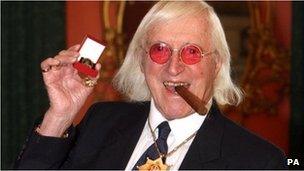Jimmy Savile abuse claims: Outsider to head BBC inquiry
- Published
BBC Trust chairman Lord Patten says the inquiry must "carry credibility"
The BBC is to bring in a figure from outside the corporation to chair its inquiry into complaints of sexual abuse made against Jimmy Savile.
BBC Trust chairman Lord Patten said the probe into what he called the "cesspit" of allegations would begin "as soon as the police give us a green light".
The Trust also asked the BBC to review its policies on child protection, sexual harassment and bullying.
It comes as more people told police they were abused by the late presenter.
Greater Manchester Police said the two reports it received were "historic complaints dating back to the 1960s". Tayside Police said a woman had reported an "historical incident" said to have taken place in Liverpool.
Meanwhile, a man contacted Cleveland Police about an incident in the early 1970s when he was aged nine.
The Metropolitan Police, which is heading the overall investigation and will study the new reports, earlier said 30 victims could be involved.
'Cesspit' of allegations
On Monday, BBC director general George Entwistle promised a "comprehensive examination" of allegations that Savile abused girls while working for the corporation would take place after the police investigation.
Addressing the Broadcasting Press Guild, Lord Patten referred to "the appalling allegations, the cesspit of the Jimmy Savile allegations" as he tackled the issues in his speech.
Lord Patten added that police were anxious that the BBC should not launch any investigation until officers were satisfied they had gone as far as they could.
And he said the inquiry would not be set up without the full agreement of the BBC Trust.
In a letter to Mr Entwistle,, external Lord Patten said he wanted to ensure the corporation's policies were "fit for purpose" after claims that abuse by Savile took place on BBC premises.
In the other developments:
The trust running Stoke Mandeville Hospital said it was shocked at claims that Savile carried out abuse there. He was a major fund-raiser for the hospital and his charitable trust was based at the site
Royal Armouries International said it has decided to rename Savile's Hall in Leeds, its banqueting venue
Savile's triple headstone was removed from Woodlands Cemetery in Scarborough overnight "out of respect to public opinion" and to avoid a "circus" and will be sent to landfill
Former BBC Radio 1 DJ Savile died in October 2011, at the age of 84.

Savile died in October 2011, at the age of 84
The face of the BBC's Top of the Pops in the 1960s, he also hosted TV favourite Jim'll Fix It on BBC One in the 1970s and 1980s and was knighted in 1990 for his charity work.
Some of the allegations - publicised in an ITV documentary - refer to incidents on BBC premises.
Speaking on BBC Radio 4's The Media Show, Lord Patten said the BBC had acted properly since the allegations surfaced.
But he said it was clear that "not only should the BBC have done more but everybody should have done more" about claims against Savile earlier.
"The fact that they were so far in the past doesn't mean we have any less responsibility and we've got to first of all make sure that nothing like that would ever be possible again, and secondly to get to the bottom of what actually happened," he said.
Lord Patten also defended the BBC over claims that its Newsnight programme shelved an investigation into the sexual abuse claims so that tribute programmes to Savile could be broadcast after his death.
"The suggestion that editorial judgement was exercised because of pressure from above, in the broader interests of the BBC as a corporation - that is of course malarkey. That's complete nonsense - that's not how the BBC operates," he said.
Culture Secretary Maria Miller said the BBC had "serious allegations" to answer, not only about the behaviour of Savile.
"Also some of the institutional problems around the way that women have been treated in the workplace, and I think they are serious issues for any organisation," she said.
During a press briefing on Tuesday, the Metropolitan Police said its probe would be a joint inquiry with children's charity the NSPCC and would be named Operation Yewtree.
The aim of the investigation is to produce a report by the end of November, looking at the lessons learned and sharing the findings with other relevant agencies.
It said the alleged victims were mainly girls who were aged between 13 and 16 at the time, and the allegations spanned four decades.
- Published10 October 2012
- Published9 October 2012
- Published9 October 2012
- Published9 October 2012
- Published9 October 2012
- Published9 October 2012
- Published9 October 2012